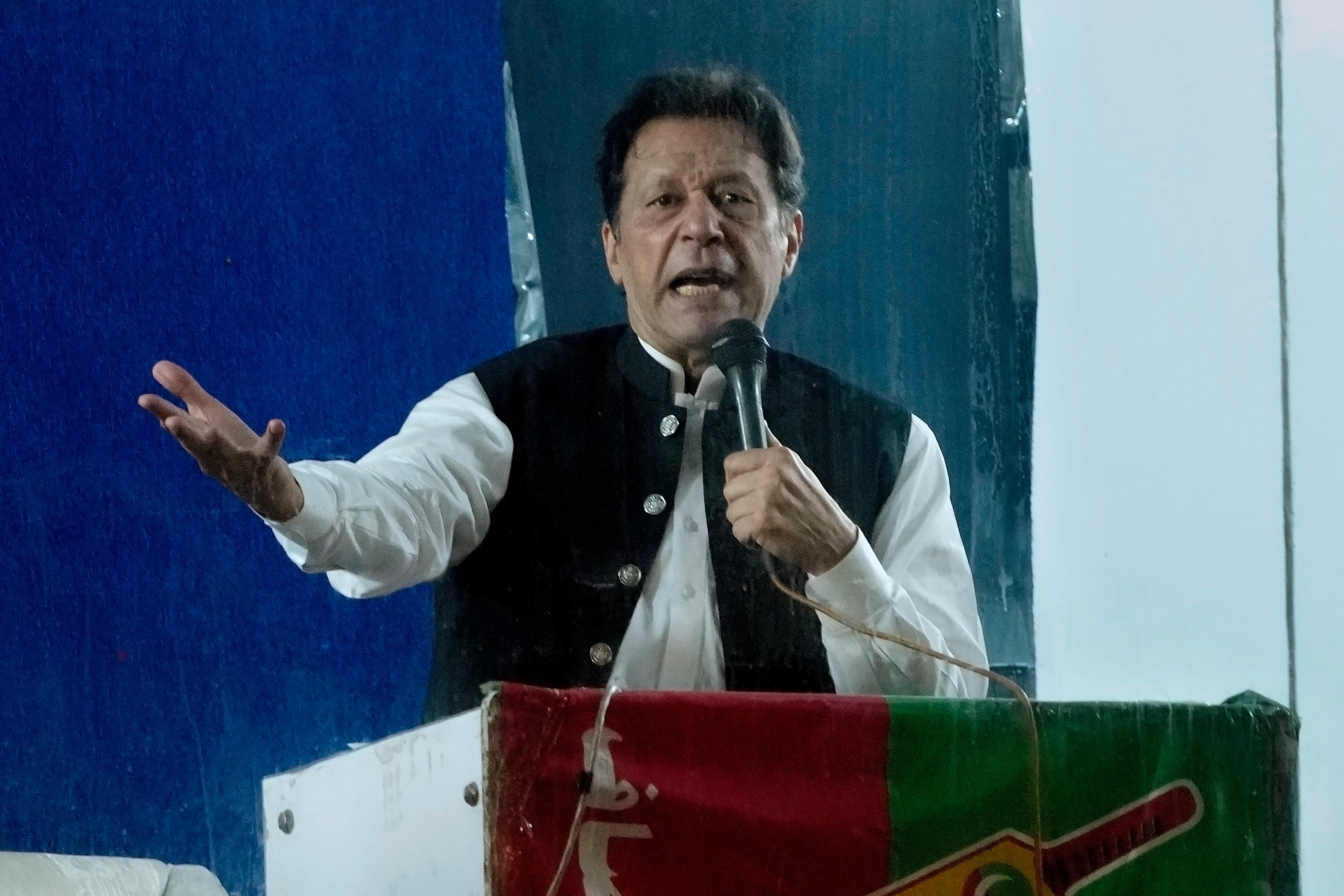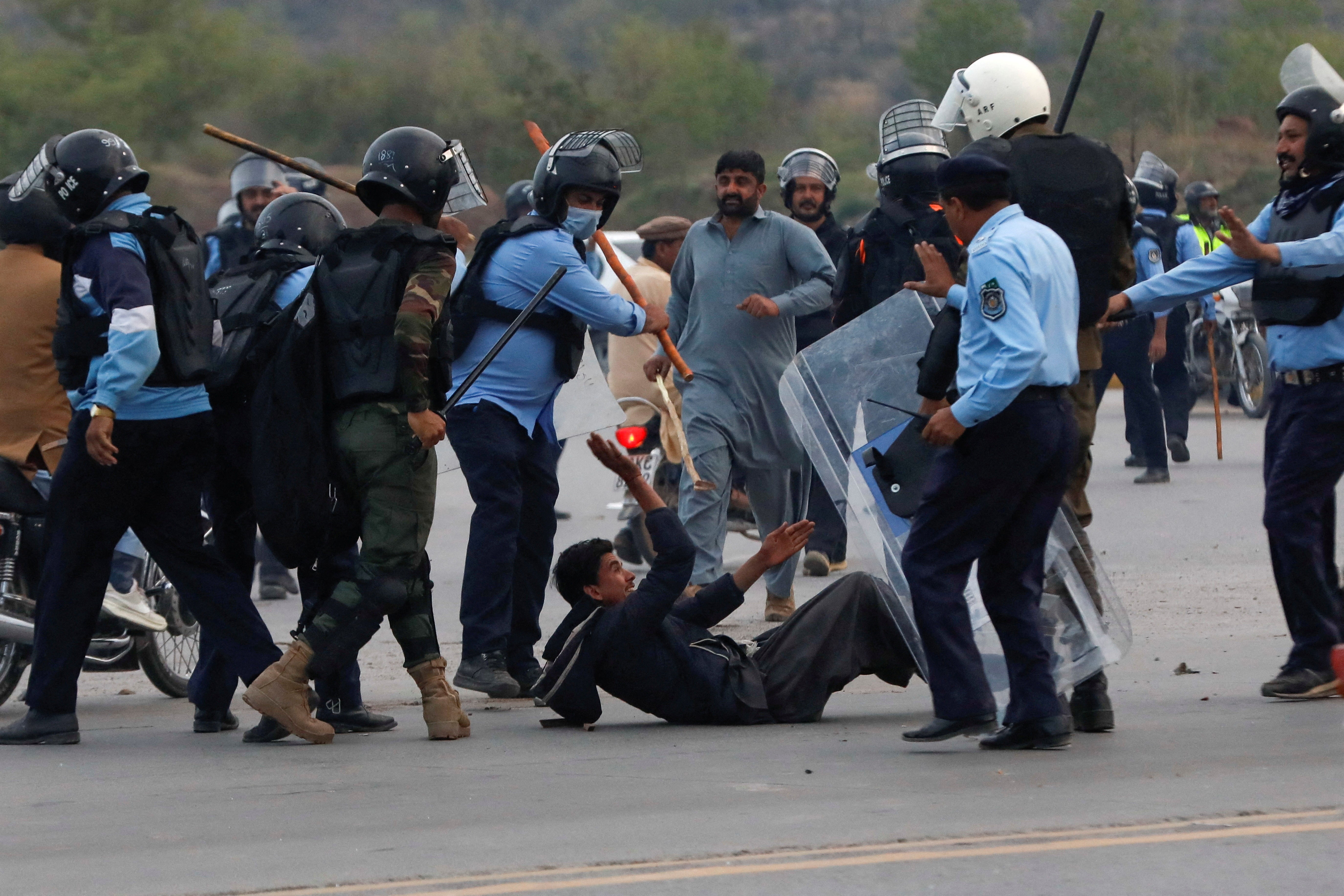‘A lasting effect’: Imran Khan reveals assassination attempt left him with nerve damage
Exclusive: Pakistan’s former prime minister speaks to Adam Withnall about being shot, his return to campaigning and the one thing he and Trump have in common


Almost five months after a gunman with an automatic pistol sprayed three bullets into his legs at a political rally, Pakistan’s ousted prime minister Imran Khan is back on the campaign trail.
The former cricket superstar turned firebrand politician addressed a rally in Lahore on Saturday for the first time since November’s attack, with ever-present fears for his safety meaning he had to speak from behind a bulletproof screen.
Speaking in an interview with The Independent, Mr Khan reveals that his right leg has suffered potentially long-lasting damage as a result of the assassination attempt. While the two bullet-wounds to his thigh have healed, a third shattered his shin bone and damaged the nerve.
“I have had more problems with the impact of the nerve damage than the bullet wounds,” he says. “I still can't walk properly, I still don’t have proper sensation in my right foot. That’s a lasting effect, which the doctor says eventually with time will heal, will go away.”
Despite his ongoing recovery, Mr Khan and his PTI party should be in full election mode by now – a key vote for control of Punjab, the country’s most populous state, had been due to take place on 30 April.
But with inflation spiralling out of control and massive street protests gathering in support of Mr Khan, the election commission cited “security concerns” and suspended the vote until October, when the next general election is also due to take place.
In his speech, Mr Khan lambasted the government with familiar accusations of corruption, intimidation and an illegal conspiracy to oust him in last year’s no-confidence motion. The Pakistan government has repeatedly denied Mr Khan’s claims, and says they are being used to whip up his supporters for an attempted return to power.
A compelling speaker with a natural ability to connect with his fervently supportive audience, Mr Khan said it was an “odd” feeling to return to campaigning behind a screen that makes it difficult to see the crowd. “Sometimes you feel you’re just talking to yourself,” he complains.
His campaigning style has drawn comparisons in the past to another celebrity-turned-politician – Donald Trump.
Both share the ability to whip up a crowd with a catchy turn of phrase and bullish rhetoric, which critics say verges on the hostile. One of the dozens of legal cases brought against Mr Khan since his ouster is for using threatening language against a female judge, warning her to “prepare herself as action would be taken against her”, although his party insist he was referring to legal action.
Asked about Saturday’s rally, Mr Khan immediately launches into a celebration of the size of the crowd that turned out to see him in Lahore’s Minar-e-Pakistan meeting ground. “You cannot imagine what happened, Saturday was almost historic,” he says. “It is the most historic venue in Pakistan. And it is the biggest venue. So it’s very difficult to fill that venue. If you do a rally there, the whole country watches, because for a party to fill that venue, it means that you have massive support.”

Like Trump in 2024, Mr Khan is attempting the difficult task of returning to power after being voted out – although in the latter’s case this was a parliamentary vote of no confidence.
But unlike in the US, Mr Khan is trying to do so in a country where political rhetoric has been replaced by open threats of violence, with the prime minister Shebaz Sharif’s home minister saying this week that Mr Khan was an “enemy” who is “incurable”. “If [Khan] thinks we want to kill him, obviously he wants to kill us as well,” Rana Sanaullah told a TV interviewer. “When we feel our existence is being threatened, we will go to a point where we will not bother whether a move is democratic or not.”
“I’ve never seen Pakistan sink to this level, ever,” says Mr Khan, pointing to his 27 years in politics since founding PTI in 1996 after his retirement from cricket. “I was opposing the military dictatorship of General Musharraf. He put me in jail for eight days. I can tell you that it was liberal compared to what is going on [now].”
Some of the persecution Mr Khan alleges he is suffering at the hands of the authorities borders on the farcical: police raided his home in Lahore on 18 March while Mr Khan himself was due to appear in court in Islamabad. During the raid, Mr Khan says officers beat up his household staff and detained his cook. “They beat him up and took him away, put him in prison and asked him: ‘What does Imran eat?’”
Police claim they recovered weapons including rifles, Kalashnikovs and petrol bombs during the raid at Mr Khan’s home and have added new terrorism charges against him and hundreds of other PTI workers as a result. The Independent has contacted the Lahore police for a response to the claims of brutality during the raid.
Other elements of the government’s alleged crackdown on PTI have drawn international condemnation from rights watchdogs. Amnesty International said on Wednesday it was “alarmed” by reports of the disappearance of Azhar Mashwani, Mr Khan’s social media chief, who has been missing since 23 March. Such apparent abducations “have stained Pakistan’s human rights record for decades and continue with impunity”, said Amnesty, as it called on the government to “immediately release all disappeared people or promptly bring them before a judge”.
Pakistan’s Federal Investigation Agency (FIA) denied having Mr Mashwani in custody in response to a habeas corpus petition filed by the missing party worker’s brother at the Lahore High Court on Tuesday. The FIA said it had no information about his whereabouts, in a filing described by a judge as “unsatisfactory”.
Mr Khan says Mr Mashwani has been targeted in particular because of his team’s success in harnessing social media to get PTI’s messaging out. “They’ve completely clamped down on the main media, they basically don’t allow me to be seen in the national media,” he says. “Now they are clamping down on social media, and the whole idea is that they should somehow completely black me out.”
Mr Khan has repeatedly accused senior figures in the “establishment” – the government working in tandem with Pakistan’s powerful military – as being behind November’s assassination attempt, and says he fears there will be more attempts on his life by an administration “worried that if I come into power, they will be held accountable”.

Indeed, he describes the aborted court appearance within the government’s judicial complex on 18 March as a “deathtrap” which he “got out of in the nick of time”. He says the warning of a plot to kill him and make it look like “some sort of commotion” got out of control came because, after three and a half years in power, he still has connections within the government security agencies.
It’s this image of himself as a threat to the established political status quo where Mr Khan accepts that there are comparisons to be made between himself and Mr Trump.
“My ideology is completely different to what Donald Trump stood for. He said greed is not a bad thing, I am the opposite. I feel that the world is being destroyed by greed. I also saw the impact of climate change much before anyone else did, and Donald Trump didn’t believe in that.
“So in a lot of ways, my ideology is different to Donald Trump. But then I guess I was an outsider like he is, I guess that would be the similar thing.”
If Mr Khan does return to power he will inherit a dire economic situation, with inflation hitting 47 per cent on one measure and delays to a long-sought IMF loan. The country is also still struggling to recover from last year’s devastating floods, which killed upwards of 1,700 people and caused $15bn in economic losses, according to the World Bank.
He set out his 10-point recovery plan on Saturday, which largely focuses on domestic policies to tackle corruption and tax evasion as well as appealing to wealthy Pakistanis abroad to send more money back home.
What’s missing is a strategy to engage the international community in raising funds and improving trade, and perhaps that’s not too surprising – attacks on the West have been one of Khan’s favourite tropes in appealing to his base. He has for decades attacked Pakistan’s relationship with the US, and he blames “a foreign conspiracy” founded in America for helping push through his ousting from office last year.
Mr Khan was the last world leader to visit Vladimir Putin in Moscow before Russia invaded Ukraine, something which he admits was “bad timing”. He says there were strong economic arguments at the time “to mend fences with Moscow”.
Asked whether he would shake Mr Putin’s hand again now if in power, given Pakistan’s economic crisis and the opportunism shown by neighbouring India in purchasing cheap Russian oil and gas since the Ukraine invasion, Mr Khan disagrees. “Going right now would mean that I’m basically endorsing what Russia has done.”
But he doesn’t outright condemn Mr Putin’s actions, either. “My whole thing is that countries like us can’t afford to be partisan, we should be neutral. Our main concern is our own people.”
Join our commenting forum
Join thought-provoking conversations, follow other Independent readers and see their replies
Comments


Bookmark popover
Removed from bookmarks